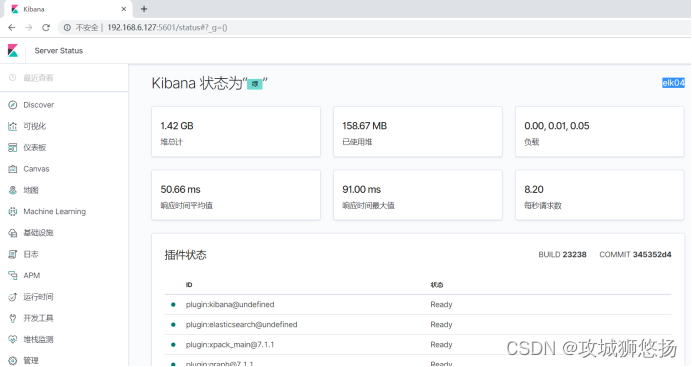Kibana开发工具安装
版本说明
| 名称 | 版本 | 备注 |
| kibana | kibana-7.7.1-linux-x86_64.tar.gz |
安装配置
tar -zxvf kibana-7.7.1-linux-x86_64.tar.gz -C /usr/local/ cd /usr/local/ mv kibana-7.7.1-linux-x86_64/ kibana-7.7.1/ #编辑配置文件,在末尾添加 vim /usr/local/kibana-7.7.1/config/kibana.yml 授权 chown -R elasticsearch. /usr/local/kibana-7.7.1/
配置文件修改
# Kibana is served by a back end server. This setting specifies the port to use.
#
server.port: 5601
# Specifies the address to which the Kibana server will bind. IP addresses and host names are both valid values.
# The default is 'localhost', which usually means remote machines will not be able to connect.
# To allow connections from remote users, set this parameter to a non-loopback address.
server.host: "172.168.9.146"
# Enables you to specify a path to mount Kibana at if you are running behind a proxy.
# Use the `server.rewriteBasePath` setting to tell Kibana if it should remove the basePath
# from requests it receives, and to prevent a deprecation warning at startup.
# This setting cannot end in a slash.
#server.basePath: ""
# Specifies whether Kibana should rewrite requests that are prefixed with
# `server.basePath` or require that they are rewritten by your reverse proxy.
# This setting was effectively always `false` before Kibana 6.3 and will
# default to `true` starting in Kibana 7.0.
#server.rewriteBasePath: false
# The maximum payload size in bytes for incoming server requests.
#server.maxPayloadBytes: 1048576
# The Kibana server's name. This is used for display purposes.
server.name: "kibana160"
# The URLs of the Elasticsearch instances to use for all your queries.
elasticsearch.hosts: ["http://172.168.9.144:9200","http://172.168.9.145:9200","http://172.168.9.146:9200"]
# When this setting's value is true Kibana uses the hostname specified in the server.host
# setting. When the value of this setting is false, Kibana uses the hostname of the host
# that connects to this Kibana instance.
#elasticsearch.preserveHost: true
# Kibana uses an index in Elasticsearch to store saved searches, visualizations and
# dashboards. Kibana creates a new index if the index doesn't already exist.
kibana.index: ".kibana"
# The default application to load.
kibana.defaultAppId: "kibana-160"
# If your Elasticsearch is protected with basic authentication, these settings provide
# the username and password that the Kibana server uses to perform maintenance on the Kibana
# index at startup. Your Kibana users still need to authenticate with Elasticsearch, which
# is proxied through the Kibana server.
#elasticsearch.username: "kibana"
#elasticsearch.password: "pass"
# Enables SSL and paths to the PEM-format SSL certificate and SSL key files, respectively.
# These settings enable SSL for outgoing requests from the Kibana server to the browser.
#server.ssl.enabled: false
#server.ssl.certificate: /path/to/your/server.crt
#server.ssl.key: /path/to/your/server.key
# Optional settings that provide the paths to the PEM-format SSL certificate and key files.
# These files are used to verify the identity of Kibana to Elasticsearch and are required when
# xpack.security.http.ssl.client_authentication in Elasticsearch is set to required.
#elasticsearch.ssl.certificate: /path/to/your/client.crt
#elasticsearch.ssl.key: /path/to/your/client.key
# Optional setting that enables you to specify a path to the PEM file for the certificate
# authority for your Elasticsearch instance.
#elasticsearch.ssl.certificateAuthorities: [ "/path/to/your/CA.pem" ]
# To disregard the validity of SSL certificates, change this setting's value to 'none'.
#elasticsearch.ssl.verificationMode: full
# Time in milliseconds to wait for Elasticsearch to respond to pings. Defaults to the value of
# the elasticsearch.requestTimeout setting.
elasticsearch.pingTimeout: 1500
# Time in milliseconds to wait for responses from the back end or Elasticsearch. This value
# must be a positive integer.
elasticsearch.requestTimeout: 30000
# List of Kibana client-side headers to send to Elasticsearch. To send *no* client-side
# headers, set this value to [] (an empty list).
#elasticsearch.requestHeadersWhitelist: [ authorization ]
# Header names and values that are sent to Elasticsearch. Any custom headers cannot be overwritten
# by client-side headers, regardless of the elasticsearch.requestHeadersWhitelist configuration.
#elasticsearch.customHeaders: {}
# Time in milliseconds for Elasticsearch to wait for responses from shards. Set to 0 to disable.
#elasticsearch.shardTimeout: 30000
# Time in milliseconds to wait for Elasticsearch at Kibana startup before retrying.
#elasticsearch.startupTimeout: 5000
# Logs queries sent to Elasticsearch. Requires logging.verbose set to true.
#elasticsearch.logQueries: false
# Specifies the path where Kibana creates the process ID file.
#pid.file: /var/run/kibana.pid
# Enables you specify a file where Kibana stores log output.
#logging.dest: stdout
# Set the value of this setting to true to suppress all logging output.
#logging.silent: false
# Set the value of this setting to true to suppress all logging output other than error messages.
#logging.quiet: false
# Set the value of this setting to true to log all events, including system usage information
# and all requests.
#logging.verbose: false
# Set the interval in milliseconds to sample system and process performance
# metrics. Minimum is 100ms. Defaults to 5000.
#ops.interval: 5000
# Specifies locale to be used for all localizable strings, dates and number formats.
# Supported languages are the following: English - en , by default , Chinese - zh-CN .
i18n.locale: "zh-CN"配置开机启动
/etc/init.d 下创建kibana
cd /etc/init.d/ vi kibanachmod +x kibana chkconfig --add kiban
#!/bin/bash
# chkconfig: 2345 98 02
# description: kibana
KIBANA_HOME=/usr/local/kibana-7.7.1/
case $1 in
start)
su elasticsearch<<!
$KIBANA_HOME/bin/kibana &
exit
!
echo "require start";;
*)
esac参考修改
#!/bin/bash
#chkconfig: 345 63 37
#description: kibana
#processname:kibana-7.6.2
export ES_HOME=/usr/local/kibana-7.6.2-linux-x86_64
case $1 in
start)
su kibana<<! [注意:kibana 是我创建的用户,改成你的]
cd $ES_HOME
./bin/kibana -p pid &
exit
!
echo "kibana is started"
;;
stop)
pid=`cat $ES_HOME/pid`
kill -9 $pid
echo "kibana is stopped"
;;
restart)
pid=`cat $ES_HOME/pid`
kill -9 $pid
echo "kibana is stopped"
sleep 1
su kibana<<! [注意:kibana 是我创建的用户,改成你的]
cd $ES_HOME
./bin/kibana -p pid &
exit
!
echo "kibana is started"
;;
*)
echo "start|stop|restart"
;;
esac
exit 0启动服务
service kibana start
http://192.168.6.127:5601/app/kibana
